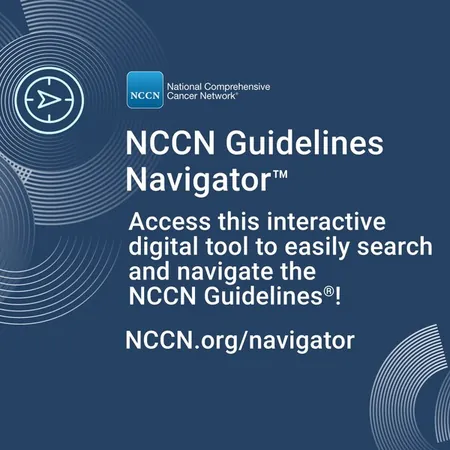
Navigating the Tightrope of Pain Management and Addiction Risks in Cancer Care
2025-01-23
Author: Yu
In the world of oncology, managing cancer pain is a paramount concern, particularly for patients grappling with substance use disorders. Unfortunately, undermanaged pain can lead to behaviors that mimic addiction, but understanding the nuances between pain management and actual addiction is critical for effective treatment.
During the recent 2024 JADPRO Live conference, Antonia Corrigan, a seasoned expert in supportive oncology, shed light on this complex issue, emphasizing the imperative balance between alleviating pain and preventing substance misuse. "To enhance patient outcomes while minimizing risks, oncologists must adopt a patient-centered approach," Corrigan stated, highlighting the need to address both the physical and emotional aspects of patient care.
Understanding Substance Use Disorders in the Oncology Setting
Substance use disorder (SUD) is a significant concern within oncology, as it affects nearly 35% of cancer patients. SUD is not simply about dependency—it often masks underlying issues such as chronic pain or mental health struggles. The Diagnostic and Statistical Manual of Mental Disorders (DSM-5) outlines this disorder, characterized by persistent substance use leading to severe impairments in multiple life areas.
Corrigan emphasized the need for oncology providers to differentiate between misuse and addiction. Definitions are critical: tolerance refers to needing more of a substance to achieve the same effect, while withdrawal indicates physical or emotional symptoms when substance use ceases. Through this lens, clinicians can better understand patient behaviors, noting that physical dependence on opioids does not inherently denote an addiction.
A Holistic Approach to Pain Management
Understanding the distinction between withdrawal symptoms and true addiction is vital to improving care for patients with cancer. Misinterpretations can lead to misdiagnosis and inadequate treatment. For instance, patients might misuse medication due to unmanaged chronic pain or anxiety rather than through a desire to abuse drugs.
The concept of "total pain," introduced by palliative care pioneer Dame Cicely Saunders, encompasses not just physical discomfort but also psychological, social, and spiritual distress. This holistic understanding can drastically improve care outcomes. Psychological factors such as anxiety and depression, social determinants like financial strain, and spiritual questions about mortality can all worsen a cancer patient's pain perception, necessitating a thorough and compassionate treatment plan.
Safe Prescribing Practices
To effectively manage pain while minimizing risks of addiction, oncologists should establish clear treatment plans that include frequent follow-ups and transparent communication with patients. Setting expectations in the initial consultations is essential, as patients are likely to feel more secure knowing they have a structured plan, including tapering strategies after treatment.
Incorporating a multimodal approach—utilizing adjuvant medications and nonpharmacologic therapies—can diminish reliance on opioids. This could include using medications like gabapentin for neuropathic pain or leveraging therapies such as acupuncture and cognitive behavioral therapy. Corrigan points out that physical activity, even modest engagement like transitioning a patient from bed to a chair, can herald significant improvements in overall well-being.
The Importance of Collaboration
For the best outcomes, oncologists should collaborate with other specialists, such as addiction medicine experts and mental health providers, to create comprehensive care plans. Social workers can also play a crucial role by addressing social barriers, linking patients to community resources that may alleviate stress associated with treatment.
Despite the complexities inherent to managing pain in patients with SUD, it's paramount that tapering protocols for opioid medications are approached with caution. Abrupt changes can lead to dangerous consequences, including relapse or a drastic decline in mental health.
Compassionate Care: The Heart of Treatment
In summary, successful management of pain in cancer patients requires a compassionate, understanding approach. By actively listening to patients and validating their experiences, oncologists can foster an environment of trust, encouraging adherence to treatment and ultimately improving patient outcomes.
Corrigan reminds us of the critical mindset needed in oncology: "Listen to your patients, talk to them, and ask yourself: What can I fix today?" This empathetic approach may be the key to untangling the complexities of pain management and addiction risks in oncology, leading to better care for some of our most vulnerable patients.




 Brasil (PT)
Brasil (PT)
 Canada (EN)
Canada (EN)
 Chile (ES)
Chile (ES)
 Česko (CS)
Česko (CS)
 대한민국 (KO)
대한민국 (KO)
 España (ES)
España (ES)
 France (FR)
France (FR)
 Hong Kong (EN)
Hong Kong (EN)
 Italia (IT)
Italia (IT)
 日本 (JA)
日本 (JA)
 Magyarország (HU)
Magyarország (HU)
 Norge (NO)
Norge (NO)
 Polska (PL)
Polska (PL)
 Schweiz (DE)
Schweiz (DE)
 Singapore (EN)
Singapore (EN)
 Sverige (SV)
Sverige (SV)
 Suomi (FI)
Suomi (FI)
 Türkiye (TR)
Türkiye (TR)
 الإمارات العربية المتحدة (AR)
الإمارات العربية المتحدة (AR)